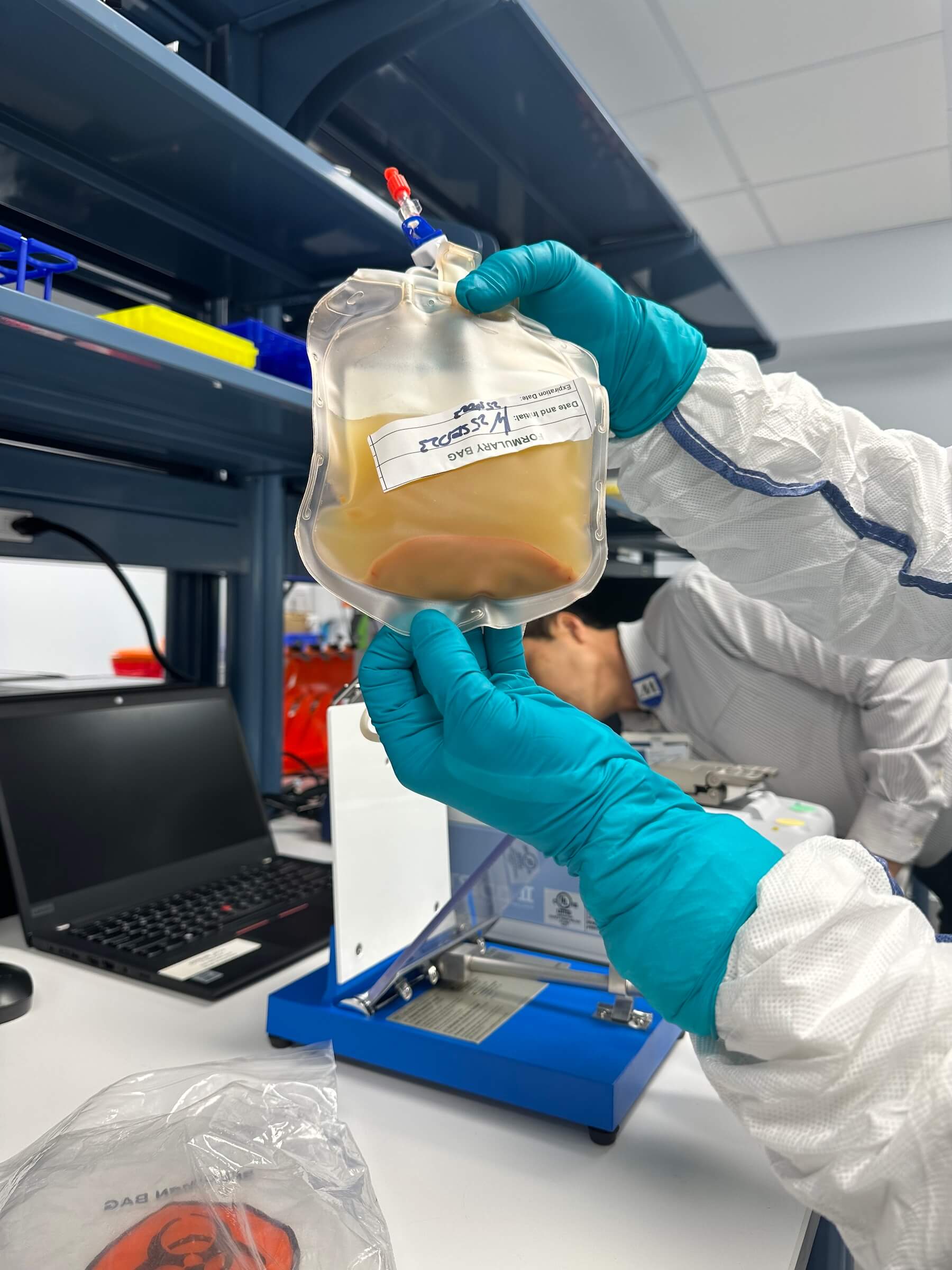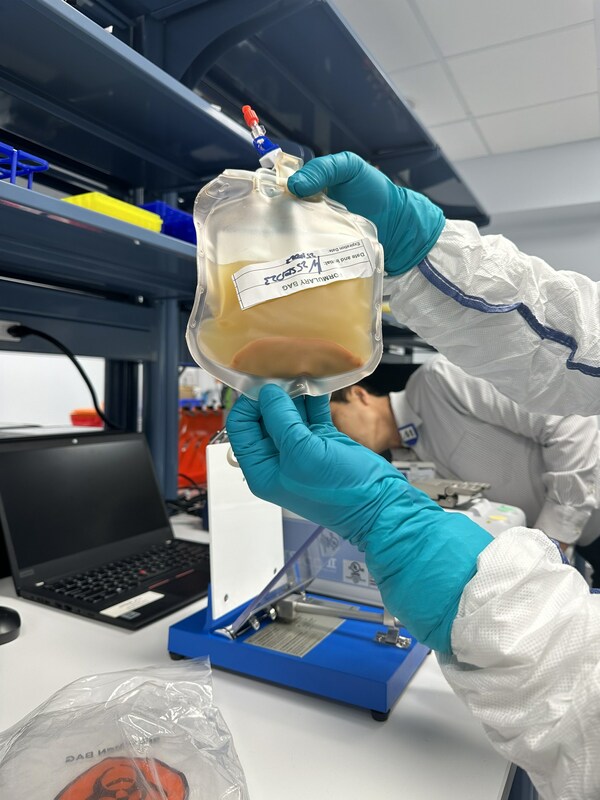Investors & Media
LyGenesis’s cell therapies are engrafted using endoscopic ultrasound procedure, which is associated with decreased medical risks and costs relative to full organ transplantation. Our pipeline of therapies target a variety of unmet needs, including end stage liver disease, Type 1 diabetes, end stage renal disease, aging, and autoimmune disorder.
LyGenesis Announces First Patient Dosed in its Phase 2a Clinical Trial of a First-in-Class Regenerative Cell Therapy for Patients with End-Stage Liver Disease

PITTSBURGH, April 2, 2024 /PRNewswire/ -- LyGenesis, a clinical-stage biotechnology company developing cell therapies for large unmet medical needs, announced today that the first patient has been dosed in their Phase 2a clinical trial evaluating their first-in-class allogenic regenerative cell therapy transplanted into patients' lymph nodes as a potential treatment for end-stage liver disease (ESLD).

LyGenesis cell solution with hepatocytes in suspension.
"In a medical first, we have now dosed our first patient in a clinical trial using their own lymph nodes as living bioreactors to regenerate an ectopic organ," said Dr. Michael Hufford, Co-Founder and CEO of LyGenesis. "This therapy will potentially be a remarkable regenerative medicine milestone by helping patients with ESLD grow new functional ectopic livers in their own body. If our study is successful and we obtain FDA approval, our allogenic cell therapy could enable one donated liver to treat many dozens of ESLD patients, which could help to tilt the current organ supply-demand imbalance in favor of patients."
Dr. Richard Marshall, CEO of Juvenescence, an investor in LyGenesis noted, "This clinical trial heralds more than an important milestone in the study of bench-to-bedside translational medicine, it is a prime example of LyGenesis's ongoing investigational efforts to translate cutting-edge innovative scientific discoveries, such as using the lymph nodes as a bioreactor to grow functioning ectopic organs, into clinical reality for patients suffering from life-threatening illnesses. LyGenesis' platform of regenerative cell therapies extends beyond ESLD to Type 1 diabetes, renal disease, and aging."
Justin Briggs, Operating Partner at Prime Movers Lab, another investor in LyGenesis, commented, "LyGenesis' cell therapy platform represents a truly remarkable potential commercial opportunity and may be transformative for chronic liver failure patients who do not have access to a donor liver. Their use of an endoscopic ultrasound as a low risk and low cost route of cell therapy administration is another way this pioneering technology could provide patients with access to life-saving therapies and address complex medical challenges by upending transplant medicine."
About LyGenesis' Liver Cell Therapy Program
LYG-LIV-001 is an allogeneic cell therapy regulated by the FDA as a Section 351 Human Cellular Therapy/Product and as an investigational biologic product. This biologic therapy is created starting from donated otherwise unmatched livers. A complex, multi-step Current Good Manufacturing Practices process carefully isolates and suspends hepatocytes in a solution to ready them for transplantation into that patient's upper abdominal lymph nodes using an endoscopic ultrasound, a minimally invasive approach. The lymph nodes then act as in vivo bioreactors, helping the hepatocytes to engraft, proliferate, and generate functional ectopic liver tissue. LyGenesis' cell therapies do not involve genetic engineering, which reduces the time, risks, and costs associated with manufacturing and commercializing their therapies.
About LyGenesis' LYG-LIV-02-001 Clinical Trial
This open-label, dose-escalation Phase 2a clinical trial is recruiting 12 patients with ESLD. Each patient receiving the cell therapy is closely monitored over 1-year through follow-up visits to examine safety, tolerability, and efficacy of the transplanted allogeneic hepatocytes as they relate to the signs and symptoms of their ESLD. A data safety monitoring board monitors each cohort of patients (N=4) to evaluate near-term safety prior to dose escalation for the next cohort of patients. A full list of the inclusion and exclusion criteria for the trial is available at ClinicalTrials.gov Identifier: NCT04496479.
About End-Stage Liver Disease
Almost 2% of the U.S. population is diagnosed with liver disease and over 50,000 Americans die annually of chronic liver disease1. ESLD is a potentially fatal disease that progresses over years and sometimes decades. Patients with ESLD have a broad constellation of symptoms and disease-related complications that affect their survival and health-related quality of life. Most often, ESLD is the result of cirrhosis, a condition in which scar tissue replaces healthy liver leading to irreversible changes in the anatomy and function of the hepatic tissue until the patients reach different stages of liver failure. Up to half of all ESLD patients who could benefit from a standard liver transplant are medically ineligible for one2, while approximately 12% of patients on the transplant wait list die annually3.
About LyGenesis, Inc.
LyGenesis is a clinical-stage biotechnology company developing a novel cell therapy platform leveraging patients' lymph nodes as bioreactors to grow functioning ectopic organs. LyGenesis' lead allogeneic cell therapy program is currently in a Phase 2a clinical trial for patients with end-stage liver disease (ClinicalTrials.gov Identifier: NCT04496479). LyGenesis' cell therapy platform including therapies in development designed to produce an ectopic thymus (for aging and multiple other potential indications), pancreas (for Type 1 diabetes), and kidney (for renal disease). Privately held, LyGenesis is headquartered in Pittsburgh, Pennsylvania. To learn more, please visit our website at www.LyGenesis.com.
Contact Information
Media contact: Jacqueline Jeha, MPH, +1.401.374.0955, media@lygenesis.com.